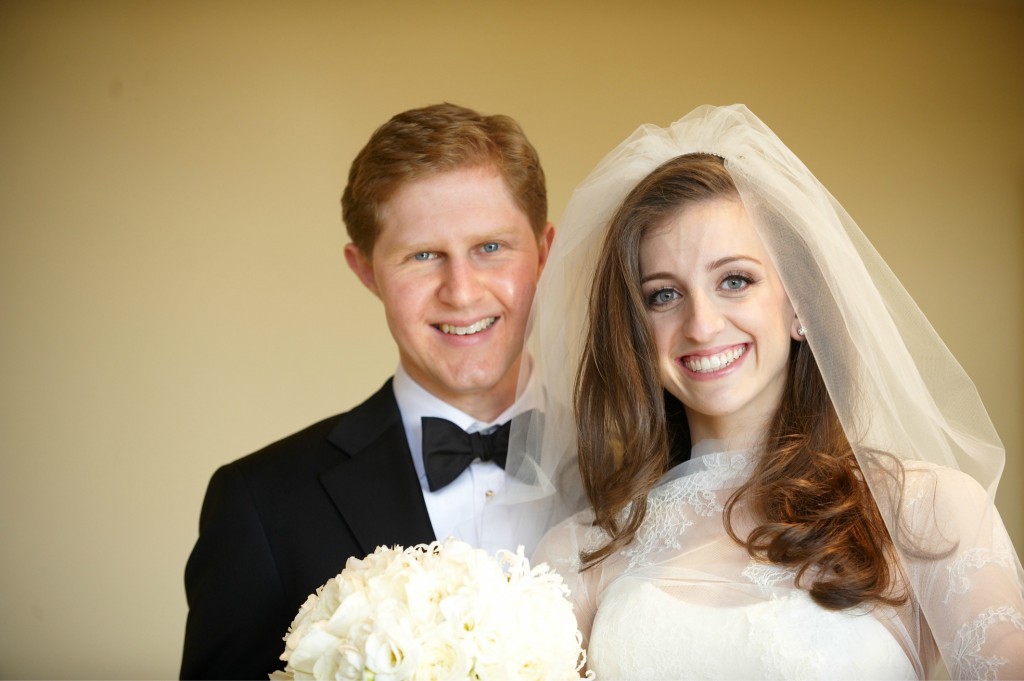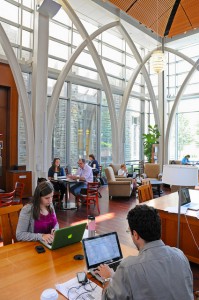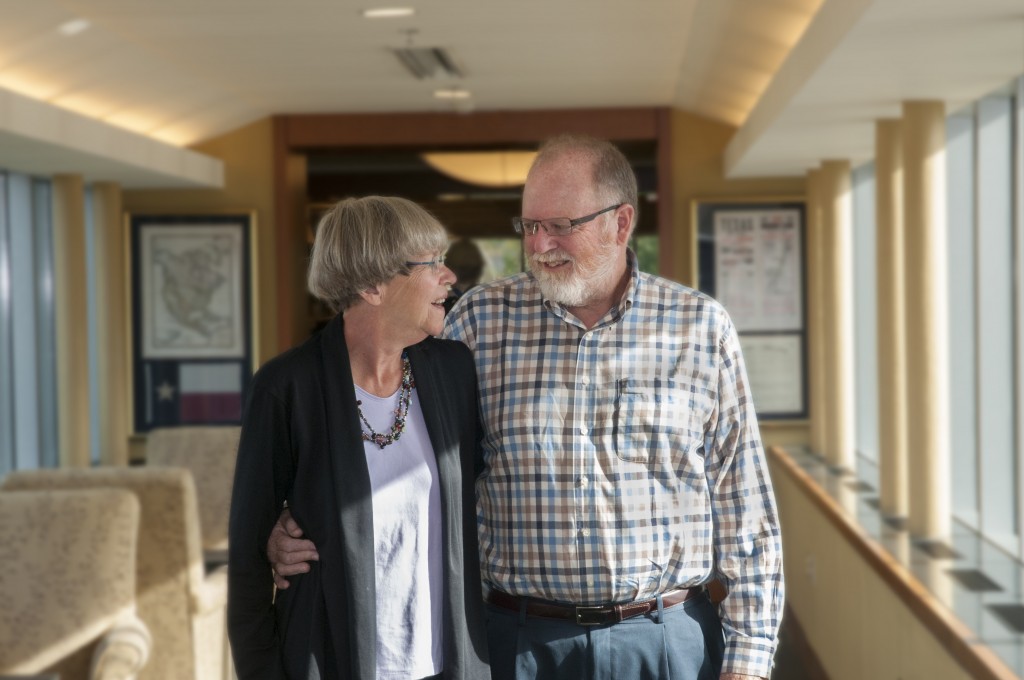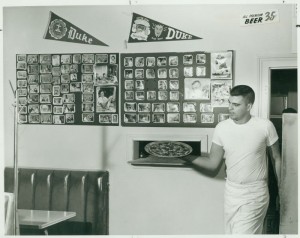
Surrounded by stories surreal and sublime,
I fell in love in the library once upon a time.
— Jimmy Buffett, “Love in the Library”
By Aaron Welborn
Maybe it’s the intimacy of hushed voices, or the mingling of public and private spheres, or just the feeling of mysterious possibility that comes from being surrounded by so many books and stories. Let’s face it—there’s something romantic about libraries.
Literature and film are full of evidence that in these temples of knowledge, more than just facts and fiction await the receptive soul. One only has to think of the New York Public Library scene in Breakfast at Tiffany’s when Paul admits that he loves Holly Golightly. Or A. S. Byatt’s celebrated novel of archival and literary romance, Possession. Or the scene in Disney’s Beauty and the Beast, when Belle is presented with a magnificent library as a demonstration of the Beast’s love. The list could go on.
Over the years, we’ve heard numerous stories of alumni who met, courted, or otherwise found each other in one of the libraries at Duke. These are just a few of their stories. We know there are many more out there. (If you have one and want to share, we hope to hear from you!) We offer them in support of the proposition that in this age of e-books, Wikipedia, and instant access to information, there’s nothing quite like a library for bringing like minds together, forever.
Steven and Nathalie Bressler

When Steven (T’07) was in sixth grade, he told his parents, “I want to learn the language of love.” It turned out to be a wise move.
Steven’s parents were both physicians, and they often worked with colleagues from around the world who spoke languages that sounded strange and exotic to an impressionable twelve-year-old. Steven longed to know what they were saying.
His parents signed up their young Romeo for French lessons. Later in high school, he added Spanish. Fast-forward to 2006, when Steven was a senior at Duke majoring in French and Spanish Cultural Studies, an independent major he designed. That fall, he was taking a seminar on the novel in French Canada, taught by Professor Paol Keineg. One day in class, the professor asked someone to read aloud a passage from a book they were discussing. Steven raised his hand, but so did a young sophomore named Nathalie Neches (T’09). The professor called on Steven, who read the passage “beautifully,” remembers Nathalie. Then Steven was asked to read another passage from the same book written in Spanish, which he also handled with ease.
Nathalie was taken aback. It wasn’t so much her classmate’s fluency that made an impression. It was the sight of Professor Keineg nodding with approval. “I was used to being at the top of my class,” Nathalie says.
She had always been a straight-A student. Because this was a small seminar—about eight people—the inevitable grading curve meant there wouldn’t be much room at the top. And here was this nonchalant senior, impressing the professor with his flawless pronunciation and jeopardizing her GPA. Something had to be done.
If Steven’s talent for languages revealed itself at an early age, Nathalie’s came by blood. Her parents were Russian and had moved the family all over the world. Her eldest sister was born in Russia, her older brother in Israel. Nathalie and another sister were born in California. She had cousins in Colombia whom the family would visit. She grew up speaking Russian, English, French, and Spanish around the house. She aced the AP French exam as a freshman in high school. Pas de problème.

After that day in Professor Keineg’s class, Nathalie approached Steven and asked him if he could give her some pointers some time. It may have seemed like a flirtatious overture, but the way Nathalie remembers it, it was pure competitive instinct, a subtle gambit to gain academic advantage. The way Steven remembers it, the most attractive girl in the class was actually talking to him.
Eventually they started dating. Because it was Steven’s senior year, he spent a lot of time applying and interviewing for jobs. Meanwhile, Nathalie was hitting the books. If he wanted to spend any time with her, Steven realized he would have to join her in the library. The first floor of Perkins Library had just been renovated, and Nathalie’s study spot of choice was back behind the reference desk. It was the social part of the library, with lots of friends coming and going and plenty of welcome distractions. (That was the only year in college she ever got a B, Nathalie admits.)
She and Steven spent countless evenings there on study dates. Later that year, they broke it off. But the separation didn’t last. Steven wanted her back, and Nathalie agreed to meet him one day over coffee in the café in von der Heyden. It was one of the few places on campus open late, and there were lots of other people around—a safe, neutral space where two people could talk and clear the air. That first conversation went okay, so they met again. And again. Eventually, after umpteen cups of coffee, he won her back.
Steven graduated in 2007 and started working in investment banking and then private equity. Nathalie graduated in 2009 with a B.S. in Economics. She followed that with a law degree in at the University of Pennsylvania. The couple married in March of 2012 and moved to New York.
Steven is now in his second year of the MBA program at the Wharton School at Penn. Nathalie is an associate at a real estate law firm in New York. But the couple fondly remembers their library dates at Duke, and the way they gradually learned to speak the same language.
Michael and Elizabeth Schoenfeld

As freshmen at Duke, Mike (T’84) and Elizabeth (T’84) both worked in the campus libraries. Mike reshelved books in Perkins. Elizabeth worked in the reserves section of Lilly Library on East Campus.
For Elizabeth, libraries always felt like home. Her mother was a librarian in their hometown of Purvis, Mississippi. In fact, she was the reason Purvis had a library to begin with. When Elizabeth was young, her mother applied to the state government for a grant to open a public library in their community. When the grant came through and the library was approved for construction, her mother enrolled in the University of Southern Mississippi and learned a master’s degree in library science so she could run it.
The library became Elizabeth’s gateway to a wider world. “The schools in Purvis were not exactly academically rigorous,” she says. It was largely by putting herself through a self-directed course of reading that she was able to get accepted at a school like Duke.
Mike also grew up around books. When he was young, he spent many weekends at Brooklyn Public Library’s children’s section in New York while his father was studying for an MBA at CUNY Baruch College. That turned into an early passion for reading. “I was the kind of kid who was always getting stars for reading the most books,” he says.
The first time Mike and Elizabeth met as sophomores in 1981, “we immediately hated each other,” Elizabeth remembers. They encountered each other at a Freewater Films screening of Private Benjamin, a comedy that appealed to Mike’s Long Island background but completely escaped Elizabeth’s Mississippi upbringing. On top of that, “he looked like he came right out of Saturday Night Fever,” recalls Elizabeth.

A few weeks later, Elizabeth was walking around the fourth floor of Perkins Library, looking for someone to talk to. In those days, the fourth floor was the public square of the library, the place to see and be seen. Mike was also there. When Elizabeth walked past, their eyes locked for a long moment. “And just like that, it was like a thunderbolt,” she said. “Love at second sight.”
She went to get a drink of water and several minutes later realized that the guy she had just been checking out was “that loser” who she had met at the movie. But still—those eyes. She decided to go back and talk to him.
The Phi Delta Theta semiformal was coming up, and Mike told Elizabeth he would be honored it if she would be his date. What he didn’t tell her was that he had methodically mapped out a decision tree, weighing all the pros and cons of asking Elizabeth or someone else. The wise move, the decision tree told him, was to choose Elizabeth. He chose wisely, and she said yes.
The next semester, they found themselves in the same Political Science class. The course was called “Politics and the Libido.” (You can’t make this stuff up). They even ended up writing a paper together. The rest, as they say, is history.
They got married in the Sarah P. Duke Gardens in 1987 and had a daughter, Abby, a few years later. She is now a senior at Barnard College. Mike embarked on a career in media and public affairs, taking on senior leadership positions at the Voice of America, the Corporation for Public Broadcasting and Vanderbilt University, before returning to Duke in 2008 as the Vice President for Public Affairs and Government Relations.
Elizabeth’s work took her into the realms of public policy, writing and editing, and gifted education. She was the director of the Vanderbilt Programs for Talented Youth before the family relocated to Durham. She recently went back to school for an MFA in creative writing and is working on novels for young adults, parts of which were written over the past two years in Perkins.
They’re also both big supporters of and advocates for public libraries. Mike served on the public library board of trustees in Nashville, Tennessee, and Durham, and recently completed a term on the State of North Carolina Library Commission.
They’ve also been generous supporters of the Libraries at Duke. In 2009, the Schoenfelds made a gift to name a study carrel on the fourth floor of Perkins Library, not far from where their eyes met that fateful day. The windows on that side of the building look out on rows of slate rooftops and the looming tower of Duke Chapel in the distance. It’s a great view—the kind of view that’s worth a second look.
Peter and Sarah English

We all have one. That special corner, table, or chair in the library that we like to think of as ours. Libraries may be spaces we share in common, but it’s natural to lay claim to our own little piece of them.
For Sarah (WC’68) and Peter (T’69), it was a table near a south-facing window in the Periodicals Room. This was in the 1960s, several library renovations and expansions ago. The main West Campus library was simply known then as the General Library. The six-floor Perkins Library was still being built next door. It was the age of card catalogs and closed stacks. If you wanted a book, you had to write your request on a slip of paper and hand it to a librarian, who would fetch it for you.
In the Periodicals Room, the leaded glass windows looked out on Chapel Drive and the statue of James B. Duke. In the evenings, you could watch the sun set behind Duke Chapel. It was a nice view.
Sarah and Peter never studied past 10 p.m. After that, they took the bus to East Campus and walked downtown to have a beer at the Ivy Room or Annamaria’s Pizza House, both popular student hangouts. That was their routine, Monday through Friday, and they looked forward to it every day. Sarah had to be back in the dorm by midnight, a requirement for all Woman’s College undergraduates.
She was an English major and Peter’s senior by one year. He was pre-med. They had met at a party in the spring of 1967. Both were on a committee of students chosen to select and invite prominent speakers to campus during a four-day event in the fall called “Symposium.” After the Symposium committee’s kickoff meeting, there was a little get-together for the student members to get to know each other. “It was love at first sight,” Sarah says.

Two years and countless post-library beers later, they got married in Cleveland, Ohio, Sarah’s hometown. She started graduate school in English at UN C, and Peter started medical school at Duke. As a graduate student, he was given a key to the mysterious locked Stack 8, where many of the medical-related library books were kept.
Occasionally, Peter would head over to UN C and join Sarah in the Undergraduate Library so they could still study together. (There was beer in Chapel Hill, too.)
After a two-year stint in New York so that Peter could do his residency in pediatrics at New York Hospital-Cornell Medical Center, they returned to Durham in 1977. Sarah finished her Ph.D. at UNC and started teaching classes there and at Meredith College in Raleigh. Eventually, Meredith offered her a full-time position. She joined the English faculty and taught there for thirty years.
Peter meanwhile joined the faculty at Duke, with a joint appointment in the departments of pediatrics and history. He taught classes in epidemiology, public health, and the history of medicine. He was fortunate to work at a school with an extensive and highly regarded History of Medicine Collection in the library, and he made good use of it in his teaching and research. For his history of medicine courses, he often required students to come to the library and delve in. At one point, he even made them get a letter signed by a librarian, certifying that they had put their hands on the primary sources of knowledge.
Throughout their teaching careers, Sarah and Peter both maintained close ties to the Duke University Libraries. Sarah served on the executive board of the Friends of the Libraries, helping to organize events, buy more library books, and build support for the Libraries across campus. As professors and bibliophiles in their own right, they accumulated a large personal library at home. But since retiring, they have begun to downsize and divest themselves of a lifetime’s worth of books. “With a grandchild around, we don’t want too many bookcases that look tempting to climb,” Sarah jokes.
They still buy the occasional autographed first edition. But they’ve become big Kindle users and discovered the satisfaction of carrying around an entire library with you.
The table in the Periodicals Room where Peter and Sarah used to study is long gone. So is the Periodicals Room itself, for that matter. It’s part of the library that is currently under renovation and will reopen as the new David M. Rubenstein Rare Book & Manuscript Library in 2015.
“But that’s the essence of what a library is,” Peter says. “Constant change.”
True enough. Libraries change. But they keep accumulating stories, like an invisible archive that exists alongside the physical books on the shelves. Each story occupies its own dedicated space, and there’s always room for more.
Read More:

